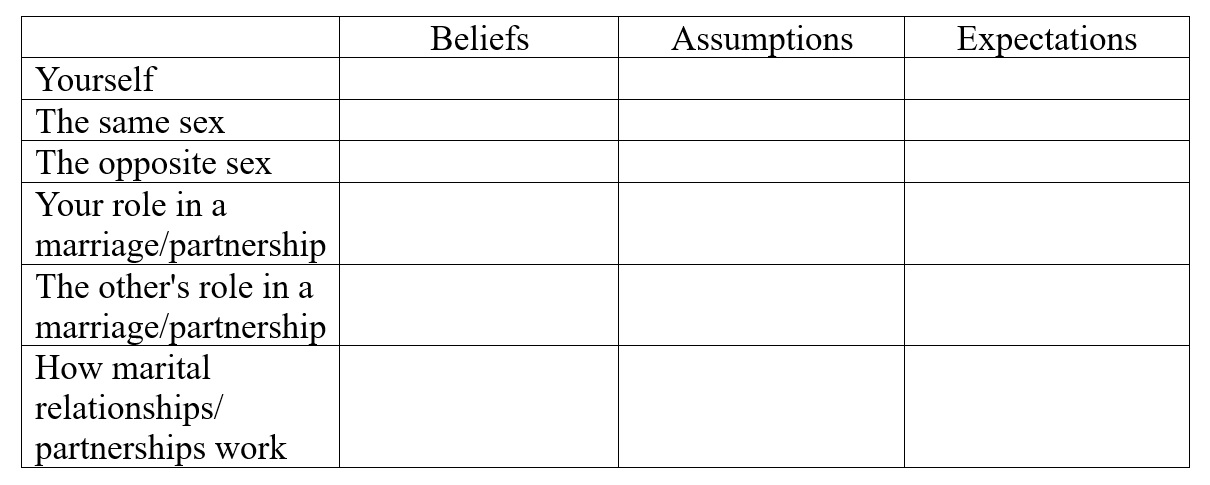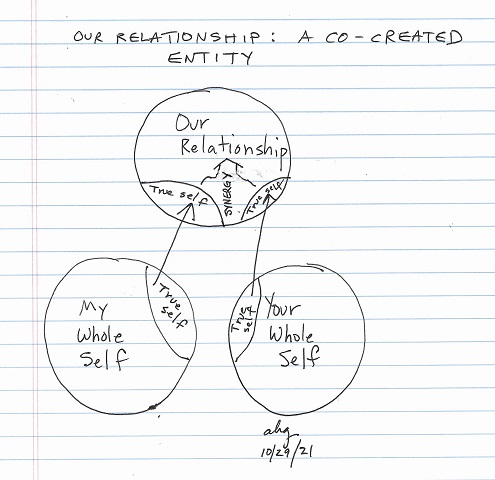Before marrying or moving in together, partners may find discussing the following questions of value. People who are individually aware of the traits, skills, and wishes they bring to a relationship may be more likely to negotiate a conscious, enriching partnership.
The questions are worded to take turns asking each other. For long-term partners, exploring these questions and renegotiating some of their answers may be helpful.
1. Let’s begin with the end in mind.
If marriage is under consideration: Why are we getting married? Or, why did we get married?
Marriage originated as a practical matter to build political and economic alliances, to control property ownership, and to ensure legitimate heirs to that property. (The first recorded evidence of marriage is from Mesopotamia in 2350 BC). Cultural beliefs came later.
Are we planning on building a dynasty? If not, if we have no great alliances to forge and no great wealth to pass to heirs, we could be life partners without marriage. By considering marriage, are we unconsciously complying with cultural norms? Why, exactly, are we doing this/did we do this?
2. What are your beliefs, assumptions, and expectations about yourself, the other, and how marriages work?
Why ask? One of the greatest challenges faced by couples is that each partner can hold the unconscious belief that the other person can read their hearts and minds, knows intuitively what the partner needs and wants, and will naturally do what they want and agree with them out of love and respect. Sometimes, unspoken cultural beliefs about “how marriages should be” are in play.
When one partner doesn’t do as expected or wished, the other partner might feel any number of feelings, including feeling surprised, hurt, betrayed, resentful, misunderstood, disrespected, and unloved.
Becoming aware of one’s unconscious beliefs prior to becoming partners can help prevent unnecessary misunderstandings and provide awareness, recognition, and clarity when problems arise.
What are your beliefs, assumptions, and expectations in the these categories?
3. Ideally, the combined power of partners working together is greater than the power of each working separately.
a) What will be our division of labor? Will we do tasks together, take turns, have assigned tasks based on skill or preference? How will we accomplish tasks neither of us wants to do?
b) In what areas are we willing to hire paid services to do household tasks? Housecleaning, cooking, accountant?
c) In what areas do you see the potential for us creating synergy together? How might we do that?
4. Ideally, partners in a partnership are able to talk about everything; no subject is taboo. What are some subjects that are more uncomfortable for you than others?
Maintaining household order, sanitary conditions
What level of order is expected and where? Who cleans what? How often?
Bathroom
Do you leave the lid off of the toothpaste tube? If you leave the lid off, and the other partner prefers it on, how would you propose resolving this?*
Toilet seat up, down, toilet paper roll facing outward or inward, bidet handle one way or the other?
When we are getting ready in the morning or at night, will we be in the bathroom together or separately? If we’re in there alone, bathroom door open, closed, sometimes open, sometimes closed? What will be the reason?
Bedroom
How will we handle dressing, undressing, and nudity?
What are you shy about?
What are your expectations for frequency of intercourse? Other forms of sexual intimacy?
Money
Do you track your spending? Do you know how much it costs to be you?
We are individuals and a partnership. How will we allocate and budget individual money and partnership money?
At what number in your bank account balance (savings/checking) do you start feeling nervous or are starting to relax a little?
What is the monetary threshold for making unilateral monetary decisions? At what level does a partner need to confer before they buy?
Do you turn off the lights when you leave an unoccupied room? Why or why not?
Health, substances, behaviors
How often do you go to the dentist? How often do you get a physical?
What is your purpose for using substances? Caffeine (tea, coffee, energy drinks), nicotine, alcohol, marijuana, other substances? What is your level of use of the internet, gambling, pornography?
Us
Do you tend to over-function or under-function in relationships?
What will be our strategy for negotiating to find common ground when we have differing views?*
What will be our strategy for addressing one partner bringing something new to the partnership? If one of us is offered a new job, develops a new hobby, or wants to go back to school, how will we address the impact of one person’s preferences or situation on the partnership? What if one of us develops a troubling behavior or returns to one? What if there is an unexpected pregnancy? What if one of us is diagnosed with a serious illness? How do we negotiate newness?*
How often will we communicate via text, phone, and/or email? At what length? What subjects are okay for text and which ones are better left to talking in person?
What is your definition of privacy? What about us are you open to me talking about with co-workers, friends, and family members?
How often will we have a “date night,” time for us to be together, just us, without friends, family, or children?
How often will we have a “housemates’ meeting” to talk about how the household is running and to talk about, and plan for, future purchases?
What do you think about our ages? Are we close in age, far apart in age? What impact do you think this has now? How about in the future?
Baby
If the baby vomits or the baby’s diaper leaks, who cleans up the mess? Both equally often, one more often than the other? Why?
If a baby, toddler, small child, child, teenager does something that you don’t wish it to do, how do you handle that? What is your discipline policy?
Other people
What is your policy about looking at and/or talking with members of the same sex? The opposite sex? In our friend circle? At work? What is your definition of an affair?
Hardships
If something upsetting has happened, do you tend to internalize (blame yourself) or externalize (blame others)?
If you have had a shock, loss, or experienced a trauma, do you prefer quiet time, to cry, to talk immediately, or something else before we talk? Are there words of comfort you find particularly helpful that I might offer you?
If you are sick, do you prefer alone time, company, or a mix of alone time and time with someone else? In what proportions?
If the biological consequences of illness have made a mess, can you usually clean it up yourself?
If you feel angry, what do you do? Do you hold it in? Do you let it out? When you let it out, what do you do? Do you throw things? Do you hit? This has to be asked: Will you hit me?
Thinking process, values, and dealbreakers
How do you decide the difference between a fact and an opinion?
What are the three most important values to you?
What three traits in your partner do you most hope will remain constant throughout your shared lives?
What actions on the part of your partner might cause an irredeemable breach in the relationship and end it?
(Doing these values and priorities exercises together might be interesting and helpful.)
General
What are three reasons almost anyone would want to stay with you?
What are three reasons almost anyone might find staying with you problematic?
*The Most Important Question of All
How will we navigate and negotiate change, disagreement and conflict?
. . . . .
Other questions and resources for couples
Illustration by Derek Zheng
Last updated 2024-10-26
All content is for informational purposes only and is not a substitute for professional advice. Consult a qualified professional for personalized medical, health care, and professional advice.




